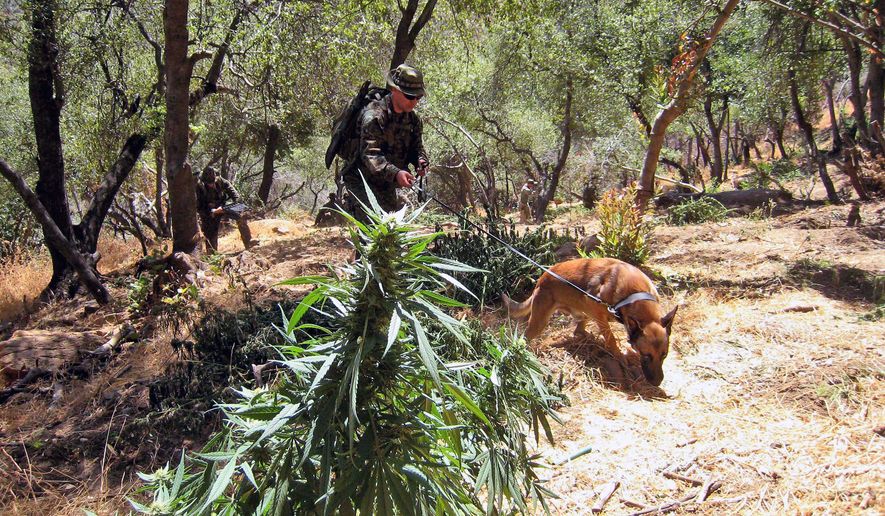SOUTH BEND, Ind. (AP) — In some places amid the seemingly endless rows of corn that dominate the farmland on the southwestern outskirts of South Bend, you can spot another plant that likes this fertile soil.
Since the early 1940s, thickets of wild marijuana have sprung up each year throughout northwestern Indiana, a remnant of World War II-era industrial hemp fields that were sown to support the war effort by furnishing raw material for parachute cords.
Police and local officials have taken measures over the years to get rid of the so-called “ditch weed” when it makes its annual appearance, but in many areas the plants are as rampant as ever, sometimes growing eight to 10 feet tall.
“It’s amazing how much marijuana is growing down there,” Capt. Phil Trent, a South Bend police spokesman, told the South Bend Tribune (https://bit.ly/1qwABfX ). “It looks like you’re in Colombia when you’re down there.”
In fact, even as some would-be harvesters continue to find their way to the patches of wild cannabis, authorities have largely backed away from seeking and destroying ditch weed - partly because of funding cuts and a focus on more sinister drugs, but also because getting rid of the plants is seen as an impossible task.
“You can eradicate ditch weed as well as you can eradicate dandelion,” said Capt. David Bursten, an Indiana State Police spokesman.
“We respond to it as we’re able. Do we have people out there searching for ditch weed? No. Generally, our efforts are concentrated on marijuana that’s being potentially cultivated.”
As recently as 1999, county weed control boards worked with the state police to find and destroy the wild pot crop every year, a program authorities described as an effort to keep Indiana from becoming part of the illegal marijuana trade, according to Tribune archives.
At the time, police said people commonly flocked to the area from as far away as Pennsylvania and New York to pick the low-grade reefer. But several years ago, funding dried up for destroying ditch weed, and police now generally respond only when property owners ask to have it removed or find trespassers trying to harvest it.
“Today we still make arrests in those cases and have instances where those plants are still being picked, and it is a concern,” said a state police marijuana eradication supervisor who asked not to be named because he conducts undercover investigations.
“It’s just there’s so much of it, I don’t foresee ever getting rid of the problem.”
The ditch weed has a very low level of the psychoactive chemical THC compared with cultivated pot, but some dealers have combined it with more potent marijuana to increase their profit margins, the state police official said.
“It is a lower grade, but it can be well tended, so it can be increased a little bit, and individuals partaking in that conduct could use it to, you know, split a good product into an average product and double their quantities.”
During World War II, the government designated about 75,000 acres in Indiana to grow hemp, and most of the lingering wild plants can be found in the region north of Lafayette and west of South Bend, according to Tribune archives and the state police official.
This year, state police have received between a dozen and 20 calls related the finding or picking of ditch weed throughout the area, the official said.
But not all property owners see the wild plants as a major issue.
Joe Burkus, who manages a large South Bend farm, said he has occasionally encountered people on the property and has little doubt they were looking for marijuana. And he once found a pile of leaves drying under a nearby overpass, but the farm has seen few problems overall.
“We know they’re going to come in there, we know they’re going to cut some, but we’re not here to play police - we’re just farmers,” he said. “They’re not hurting anything, and we don’t worry about it too much.”
Trent, the South Bend police spokesman, said local police also field occasional calls about the wild marijuana and people who illicitly try to harvest it. In some cases, trespassers have been found with garbage bags of the ditch weed.
The plants are still illegal to possess, Trent said, and once police become involved, they are obligated to treat the weed as legitimate, high-quality marijuana. Narcotics officers can spot the differences, but they still seize the ditch weed and take it for standard testing.
But such incidents have declined as the wild pot has increasingly paled in comparison with imported marijuana, he said, and even though the weed can be found in large quantities, anyone looking for a quick high would likely be disappointed.
“It’s a terrible quality, so whoever is harvesting it probably thinks they’ve hit a gold mine, when in fact hemp for rope-making is a far cry from marijuana,” he said, “but it looks the part.”
___
Information from: South Bend Tribune, https://www.southbendtribune.com




Please read our comment policy before commenting.